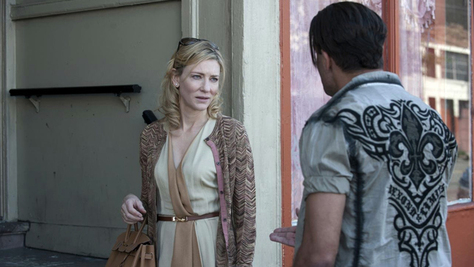
I've been on a Woody Allen kick lately. I'm not sure if it's because of the winter season, which somehow lends itself perfectly to an Allen-directed drama/comedy, but something about burrowing into the covers and watching incredibly flawed characters come to life is both satisfying and wholly entertaining. (I suppose it has something to do with the pleasure of watching characters worse than oneself go through the perils of daily life.) Today I got my hands on Blue Jasmine, the 2013 charmer that's been making itself known this awards season. It's been hailed as one of star's Cate Blanchett's most involved roles, and, I find, with good reason. Blanchett embodies the role of Jasmine (also known as Jeanette) seamlessly, breathing to life a New York socialite turned disgraced widow of a Madoff-esque Wall St. investor (Alec Baldwin). As you would expect of any Wall St. socialite wife, Jasmine has long been cuckolded and is just barely sustaining herself with prescription drugs and alcohol. After Jasmine's husband commits suicide in jail and the last of her funds run out, Jasmine seeks the help of her sister, Ginger (Sally Hawkins in her usual charming and Happy-Go-Lucky way but this time with an unusual, presumably American, accent), and takes up with her in her San Francisco apartment, shared by Ginger's two sons. Fumbling her way through the film by popping pills and downing martinis, Jasmine tries to get back on her feet the only way she knows how: lying and judging her way through each increasingly embarrassing and traumatic interaction as she looks, desperately, for a new man to support her.
What I find undeniably satisfying about Woody Allen's films is his ability to create bitingly accurate representations of modern relationships and love from the most topical of sources. In Blue Jasmine, Jasmine and her husband Hal are the epitome of New York money: think Wolf of Wall St.'s Jordan Belfort (Leonardo DiCaprio) or real-life Ponzi scheme crook Bernie Madoff. In both stories of classic Wall St. corruption, Belfort and Madoff take center-stage in the financial investment drama, but who hasn't wondered what goes on in the minds and lives of their 'embittered' wives? The wives who stood by them for years as they made off with and flushed away the retirement funds of hard-working individuals? The wives who claimed to know nothing about what went on behind-the-scenes, yet enjoyed the wealth their husbands plundered away from the undeserving? This element puts Jasmine in a complicated position for the audience: we don't know whether or not we should or want to sympathize with her. This mystery follows the entire narrative of the story. The structure, which is an excitingly elliptical narrative of flashbacks interlaced with present-day drama, keeps you from siding with any character throughout. It reveals little at a time, culminating in a resolution that, though far from blindsighting, is nevertheless a resolution that raises more questions than it answers, however, provides an aspect to the story that further complicates the audience's connection with Jasmine.
Also worthy of note is Sally Hawkins, who plays Jasmine's adopted sister Ginger. The two women share a complicated dynamic in which Jasmine is constantly advising, to the point of nagging, Ginger to find a man who isn't a loser--a worthy man who will show that Ginger has self-respect. Ironically, Jasmine herself is the sister who needs to learn about self-respect. Compared to Ginger, who's enjoying her own apartment and thriving in her love life, Jasmine is broke, homeless, and still recovering after a nervous breakdown. It's a telling portrait of our contemporary mindset of striving for the best--an end goal--and completely missing out on the importance of what's in front of us. In her continual struggle to find material items to self-validate: the house, the husband with a presence in the public eye, the first-class flights, the high-status career, Jasmine has lost those most important to her, resigning herself to the one person she left out the most when she was at the top: her sister.
Though the ending feels rushed and leaves much to be desired, it is a fittingly open-ended resolution for a woman who is in-transition. While we may never know what happens to Jasmine, the film delivers its own sense of justice by closing with the message that those who screw up get what's coming to them. It's a dark and cruel stance, but honestly, who's going to argue with it?
Overall: 78%
Also worthy of note is Sally Hawkins, who plays Jasmine's adopted sister Ginger. The two women share a complicated dynamic in which Jasmine is constantly advising, to the point of nagging, Ginger to find a man who isn't a loser--a worthy man who will show that Ginger has self-respect. Ironically, Jasmine herself is the sister who needs to learn about self-respect. Compared to Ginger, who's enjoying her own apartment and thriving in her love life, Jasmine is broke, homeless, and still recovering after a nervous breakdown. It's a telling portrait of our contemporary mindset of striving for the best--an end goal--and completely missing out on the importance of what's in front of us. In her continual struggle to find material items to self-validate: the house, the husband with a presence in the public eye, the first-class flights, the high-status career, Jasmine has lost those most important to her, resigning herself to the one person she left out the most when she was at the top: her sister.
Though the ending feels rushed and leaves much to be desired, it is a fittingly open-ended resolution for a woman who is in-transition. While we may never know what happens to Jasmine, the film delivers its own sense of justice by closing with the message that those who screw up get what's coming to them. It's a dark and cruel stance, but honestly, who's going to argue with it?
Overall: 78%


 RSS Feed
RSS Feed